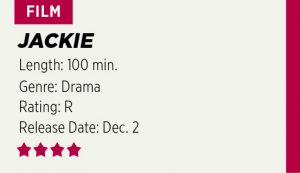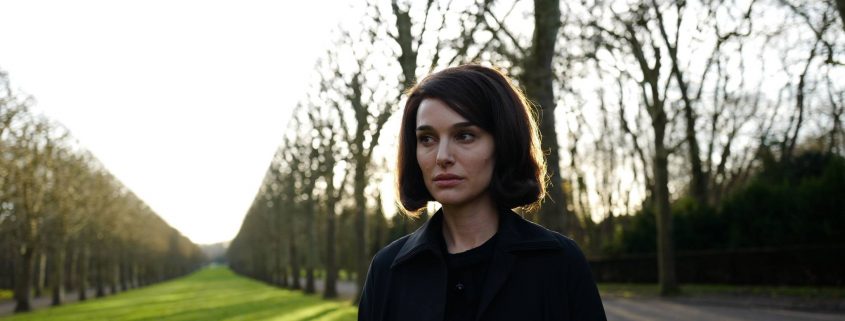REVIEW: Natalie Portman stuns in biopic Jackie
 An elegant and contained examination of a woman under the spotlight, Jackie is a picture as refined as the former First Lady herself. Directed by Pablo Larrain, the film depicts the events of the week following John F. Kennedy’s assassination through the eyes of his widow, Jackie Kennedy. Filmed with an almost unnerving degree of subtlety and ingrained with deep psychological drama, Jackie is a startlingly intimate portrait of one woman’s grapple with grief under an entire nation’s watch. The titular role is played by Natalie Portman in one of the most striking performances of the year.
An elegant and contained examination of a woman under the spotlight, Jackie is a picture as refined as the former First Lady herself. Directed by Pablo Larrain, the film depicts the events of the week following John F. Kennedy’s assassination through the eyes of his widow, Jackie Kennedy. Filmed with an almost unnerving degree of subtlety and ingrained with deep psychological drama, Jackie is a startlingly intimate portrait of one woman’s grapple with grief under an entire nation’s watch. The titular role is played by Natalie Portman in one of the most striking performances of the year.
Jackie is structured around a now-infamous interview between Jackie and a journalist, played by Billy Crudup, conducted one week after her husband was killed. The unnamed reporter interviewed Jackie in her quiet Massachusetts home, but he did not treat her as everyone else does, as a fragile and naive young widow. Instead, the reporter asked Jackie honest and brutal questions about her children, the funeral arrangements she chose for her husband and the tragic day in Dallas. Through flashbacks, the audience witnesses the week unfold along with Jackie’s grasp on what’s true in her world. Though the interview-leading-to-flashbacks structure is overused, Jackie is a film so gracefully told that the trope becomes lost in both the simplicity of the story and Portman’s jaw-dropping performance.
Portman’s portrayal of Jackie Kennedy can only be described as remarkable. With every intonation and light-footed step, the actress opened for the audience a window inside Jackie’s state of mind in the days after her husband is killed — a state of mind that continues to this day to mystify the American public. Why did Jackie decide to plan the funeral as an extravagant horse-drawn procession through eight blocks of Washington? Why did she decide to parade her children under public eye during this event? Why did she try to hold her husband’s skull together after he was shot in the head? The audience still doesn’t know. Portman still offered them incredible insight.
Jackie is not a particularly intimidating woman, but that doesn’t mean she’s not strong-willed. When she is First Lady, Jackie draws her spirit off showcasing the bounty of her husband’s office. It means as much to Jackie to look and feel presidential as to be married to the President himself. So when John F. Kennedy (or Jack, as Jackie calls him) is killed, it means the loss of her husband but also the loss of her title. If Jackie isn’t the First Lady anymore, then who is she?
Portman filled the role with impeccable nuance. She had a calm outward face brimming with hysteria, one that, in the aftermath of tragedy, led to questionable choices. And yet, Portman left no room for the audience to judge Jackie because they were immersed in her character. Though nervous and grieving, Portman was still regal in her portrayal of the iconic First Lady. The decisions she made in the days after the assassination — even if they were the wrong decisions — demonstrated Jackie’s need to hold her head up and demand respect for her husband’s title. And yet, this struggle for making meaning out of someone’s life translated easily to her own introspective dance with the devil. It was not just her husband’s future that Jackie mourned during the funeral. It was, in a way, also her own.
Jackie is less of a biopic than a psychological drama — one that at times veered into the disturbing. This is due in part to the film’s cinematography. Throughout most of the film, director of photography Stephane Fontaine utilizes center-framed shots. Though such a choice could feel unnatural, it works here because the attention is on Portman, and she is always surrounded by Jean Rabasse’s gorgeous production design.
The film’s unique framing works in harmony with an unnerving score to create an uncanny, introspective effect. In one heartbreaking sequence, as Jackie walked through the White House alone, covered in her husband’s blood, it could almost be a scene from a horror film. But of course, historical poignancy works in tandem with cinematography and music to replicate Jackie’s damaged psyche. A natural grain and minimal lighting work to root the film in the real world.
Jackie is not trying to be an expansive film, and so it is curious why its third act unravels the way it does: the ending drags on as the audience grows restless. It was disappointing that the movie did not end as it played for most of its run time: tightly woven, neatly paced, with barely enough room for the audience to take a breath.
Aside from these setbacks, the film was a masterful portrait of Jackie Kennedy. In a year so fraught with political tension, it was quite poignant to see one of the most iconic First Ladies in American history struggle with and find solace in the midst of national tragedy.

